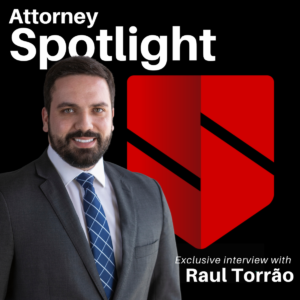ATTORNEY SPOTLIGHT: Raul Torrão
Sequor Law Attorney, Raul Torrão, shared his insights about the legal industry on this month’s Attorney Spotlight.
Why did you choose to become a dual-licensed attorney in Florida and Brazil?
I decided to become a licensed attorney in the U.S. to pursue and advance my career in international law. Born and raised in Brazil, I worked as an attorney for a few years in São Paulo, mainly with international clients. There, I saw that studying the common law system and being licensed in the U.S. would be a great asset that few attorneys have the chance to add to their skillset. I specifically chose Florida for two reasons: Florida is the gateway between Latin America and the rest of the world, and I am absolutely passionate about Miami.
Why did you elect to join Sequor Law?
Sequor Law offers many advantages that an attorney would generally seek in a law firm. Foremost, is that I work with some of the top practitioners in the area, and nothing compares to learning from the best. When it comes to asset recovery and cross-border insolvency, my colleagues are often contributing to developing case law. Also, the international asset recovery practice is interesting and rewarding. The investigative work involved is fun, and representing people who were defrauded or otherwise done wrong is personally fulfilling, believing, as I do, that the practice of law is an instrument of justice.
What practice areas do you focus on?
My practice is focused on international asset recovery–from foreign judgment domestication and enforcement to fraud and divorce cases–as well as cross-border insolvency.
How does having legal experience in another jurisdiction impact your skillset and ability to help clients?
Having experience as a Brazilian attorney while working on international cases as a U.S. attorney is like having an extra set of tools in my tool-belt. It is helpful in a variety of ways. For example, when representing a Brazilian client, speaking the same language goes a long way, and I am not just referring to the fact that we both speak Portuguese; I mean understanding the cultural nuances, the legal terms, the legal system, and so much more. Precise communication is a tremendous advantage for both the client and the firm. In addition, expertise in both U.S. and Brazilian law is invaluable when they are the two sides of the same coin, as they often are in our cases. That sort of in-depth knowledge comes in handy while developing the case strategy with the client and prosecuting the case in the US.
Could you provide an example of how that skill set helped forward client objectives?
Just as some words only exist in Portuguese–such as “saudade”, meaning the empty feeling in your heart when you miss a loved one– some Brazilian legal concepts are difficult to translate and explain if one is not familiar with comparable terms in English. A good example of how that knowledge is key to forwarding clients’ objectives and one I encounter in my daily practice, involves deciphering the details surrounding a Brazilian judgment in a judgment domestication and enforcement action in the U.S.
First, the client can make a more informed decision when the process in the United States is explained in familiar terms, with greater attention to the diverging points, such as, what are the enforceable assets of the debtor. Second, efficiencies are greatly increased when the attorney can read legal documents in their original language and knows what other documents might have key additional information. Third, the attorney can rapidly identify inaccurate allegations presented by the judgment debtor and prevent them from causing delays in the case. For example, an inaccurate allegation that the document presented was not a judgment under Brazilian law or that a certain interim appeal pending in Brazil had suspended the Brazilian enforcement action can be quickly clarified to the court, getting the case moving forward without delay.
Does your knowledge and experience abroad help you in cases that are not specifically related to Brazil?
Absolutely! Knowledge and experience with how the civil law system works is transferable in a great number of cases involving other civil law jurisdictions. Having the mindset of an attorney trained in different jurisdictions helps to keep one mentally agile, ready to pivot and generate new and inventive solutions.
How is Sequor Law different from other competitors?
In addition to a team of multilingual attorneys and professionals, the team leverages decades of multi-jurisdictional experience in asset recovery practices and their access to an extensive global network sets the firm apart.
What advice would you give a bilingual attorney fresh-out-of-law-school?
Work with an international law firm to assist with international clients and in a geographical area that has many corners.
What is your book genre preference for leisure reading?
Novels that have a touch of real history, mixing reality and fiction.






Leave a Reply
Want to join the discussion?Feel free to contribute!